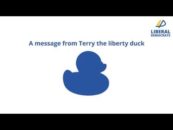Free speech is a lot more than the right to freely comment on issues of race — important though that is. There is other legislation that contains restrictions on speech just as oppressive and infantile as section 18C of the Racial Discrimination Act.
If you “insult” a registrar in bankruptcy proceedings, you face six months’ imprisonment. The same applies if you “insult” someone officiating over your entitlement as a veteran, or your claim to copyright.
If you “insult” a member of the Fair Work Commission, you could end up in jail for a year. In fact, there is a long list of government bodies that you can’t “insult” without risking jail time.
Whatever we might think of 18C, at least its penalty for insulting someone on the basis of race, colour, national or ethnic origin is not jail time.
Bans on insulting government bodies should go; only behaviour that disrupts, interrupts or threatens the bodies’ proceedings should be outlawed.
Repealing 18C while retaining prohibitions on insulting government bodies on pain of imprisonment suggests those bodies should have superior status to the people they serve.
We also need to consider the expanding range of secrecy laws in this country.
It is illegal for a journalist to endanger lives by knowingly blowing an undercover operation by our police or spy agencies, just to grab a headline.
This is as it should be, but Australia’s secrecy laws go far beyond this. If journalists reveal corruption or incompetence in undercover operations, they could face up to 10 years in jail. If they report information about police undercover operations that’s already public, they could still face jail time.
And it’s not just journalists who face these restrictions; if you mention to your neighbours that their house was searched by the cops while they were away, you can be jailed for two years.
Repealing 18C while retaining heavy restrictions on reporting of police operations suggests we don’t take police corruption and incompetence seriously. Then there are the restrictions on free speech linked to terrorism. These can be counterproductive. For instance, encouraging terrorism or genocide, without actually inciting any terrorism or genocide, is punishable by up to seven years’ imprisonment. The problem is that this suppresses mouthing-off by idiots as well as the reading aloud of hateful passages from the Koran or the Old Testament.
It would be better to allow this mouthing-off and preaching to occur, not just so the ideas can be rebutted, but so our security agencies can identify people who should be subject to surveillance.
Restrictions on free speech often attract little sympathy from mainstream society when they affect only a section of it.
Consider adult fans of weird sex and sadomasochism. They can’t obtain or share material depicting their pastime because our censors ban this material on account of “community concerns about violent or demeaning depictions”. Even though these depictions need never leave the confines of a person’s home, they are banned because they “offend against the standards of morality, decency and propriety generally accepted by reasonable adults”.
If we oppose 18C because it restricts what we want to say and hear, but support censorship laws because they restrict what other people want to see, then we’re only protecting our own freedom.
Some restrictions on free speech are just plain silly. We have election “blackout” laws based on the idea that a television or radio advertisement a week before election day won’t make you cast a silly vote, but a TV or radio advertisement a day before the election might.
Internet messages and texts sent to your mobile, on the other hand, won’t make you silly, no matter when they occur.
We have excessive restrictions on using the word “Anzac” too. It’s a good idea to ban private ownership of the word “Anzac” in trademarks, registered designs and registered business names. But the law goes further and bans anyone from using the word when naming things such as their boat or their biscuits — unless a minister gives permission. In a debate about banning offensive speech, a government banning you from using the word “Anzac” is perhaps the most offensive of all.
All restrictions on free speech in Australian law need to be challenged, wherever they occur. In a wide-ranging battle of ideas, the truth invariably comes out on top.
David Leyonhjelm is a Liberal Democrats senator for NSW.
First published in The Australian.









